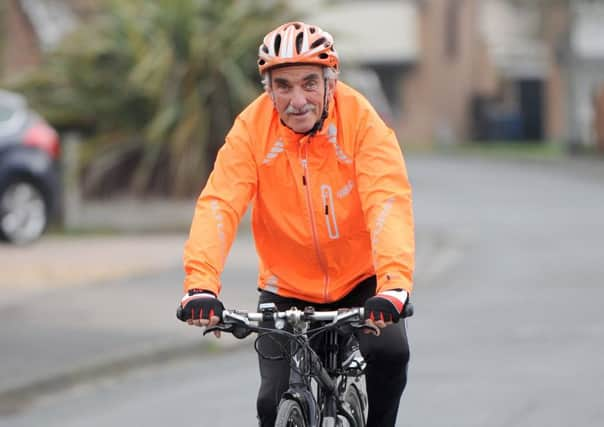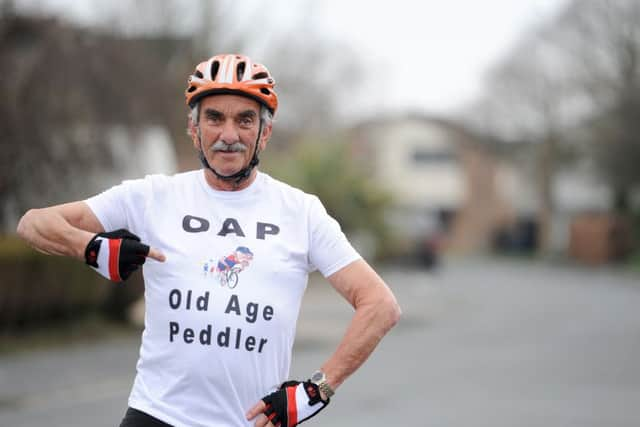NHS AT 70: '˜Doctors in intensive care saved my life'


Ned Branton had to be kept alive by machines after he developed Weil’s Disease during a fishing trip – but was diagnosed in time to fully recover.


The 73-year-old, who still manages to cycle 100 miles a week, said: “It’s no exaggeration to say that the doctors in intensive care saved my life and I will always be grateful to them for giving me my life back.”
Advertisement
Hide AdAdvertisement
Hide AdNed, a retired ventilation designer at BNFL, picked up the disease while angling for carp in Preesall, but didn’t feel poorly until the next day, when he went for a bike ride.
“When I got back I felt a bit weird, like I had flu,” the Larbreck Avenue, Elswick, resident said. “The next day my legs started to swell.”
Weil’s Disease, which can cause flu-like symptoms, can lead to kidney failure – and when Ned went to see his doctor in Kirkham, he was unable to give a urine sample.


He could also barely stand.
“They took a blood test and said they would let me know,” Ned said.
Advertisement
Hide AdAdvertisement
Hide Ad“At midnight, the phone went and it was the ambulance saying they were on the way to pick me up.
“It came and took me straight to Blackpool Vic, and I went straight to intensive care.”
Ned, once a keen fell-walker and skier, found himself seriously ill. His legs swelled so severely, surgeons had to cut them both open to relieve the pressure.
He was placed in an induced coma and hooked up to oxygen and dialysis machines.
Advertisement
Hide AdAdvertisement
Hide Ad“They told my missus to expect the worst,” he said. “They were keeping me alive. I was at death’s door.”
Around the same time as Ned’s ordeal, in September 2010, double Olympic champion Andy Holmes died from a suspected case of Weil’s Disease.
The death of the 51-year-old, a team-made of legendary rower Sir Steve Redgrave, led the sport’s governing body to warn rowers to maintain good hygiene.
A condition affecting just dozens of people a year in the UK, Weil’s is contracted through the urine, blood, or tissue of animals and rodents. It’s most commonly contracted through contaminated fresh water.
Advertisement
Hide AdAdvertisement
Hide AdIt’s easily treated with antibiotics if spotted, but it’s rare.
Luckily for Ned, once a member of the Fylde Coast Jazz Men group, doctors at Blackpool Victoria Hospital were able to diagnose him before it was too late.
And a week after being admitted, he was awake and recovering. He said: “When I started to come around, the doctors and nurses were leaning over me. I thought I had been abducted by aliens, I honestly did.
“I was a bit funny for a couple of days.”
He added: “Since I have had that nasty disease I never take anything for granted. I appreciate each day. The doctor said, ‘You have survived this because you’re pretty fit for my age’.”
Advertisement
Hide AdAdvertisement
Hide AdBut life hasn’t been plain sailing for Ned since his illness.
His wife Virginia died on New Year’s Eve, aged 73, from sepsis.
She had been battling cancer, and had three rounds of chemotherapy.
She also received treatment at the Rosemere Cancer Centre at the Royal Preston Hospital.
Advertisement
Hide AdAdvertisement
Hide AdDespite the heartbreaking circumstances – Mrs Branton died at 3.30am before Ned could arrive to be by her side – he said the care given to his wife was also top notch.
He said: “They were brilliant and very helpful.
“I can’t fault them.”
Help us to celebrate the NHS
In July this year, the National Health Service turns 70.
In the years since 1948, the NHS has cared for us all, from cradle to grave.
As the 70th birthday approaches, we want to celebrate the NHS, and the fabulous men and women who work within it.
Advertisement
Hide AdAdvertisement
Hide AdWe would like our readers to help us celebrate by sharing their stories of how the NHS has helped them.
From bringing mother and babies through difficult births, to cutting edge cancer treatments and life-saving emergency care, we want to hear from you.
• If you have a story to share please email [email protected] including your number, or call 01772 838164.
How award-winning health service team has helped to improve patients’ nutrition
Advertisement
Hide AdAdvertisement
Hide AdA nutrition nurse about to turn 65 said the NHS is now better at feeding patients than ever before.
Progress in the different ways poorly people can be fed has meant they can now get all the nutrients they need – leading to better recovery.
Thelma Shaw started her training as a cadet nurse in the early 1970s and is now a specialist nurse and lead practitioner for nutrition in an award-winning team at the trust which runs Preston and Chorley hospitals.
She said that, while patients once got a limited choice – and perhaps a pint of Guiness on a night – they now get everything they need through a variety of devices.
Advertisement
Hide AdAdvertisement
Hide AdThey can include a percutaneous endoscopic gastrostomy (PEG) into the stomach through the abdominal wall, or intravenously.
“We didn’t have anything like that back then,” she said. “The food they get is a liquid but it contains all the right calories and vitamins.
“You need it to keep your body going. It helps the body recover and reduces the length of stay in hospital.”
The nutrition team, which was set up in 2004, has a rapid access clinic providing seven-day-a-week help, and works with medics and dieticians to ensure patients are fed.
Advertisement
Hide AdAdvertisement
Hide AdIt has won a number of awards for its work – the rapid access clinic was the first in the UK – and means patients at Preston and Chorley should never miss out.
Speaking after it won in the Nutrition Nurse of the Year category at the British Journal of Nursing Awards in 2016, consultant nurse Tracy Earley said: “Developing a seven-day service is the right thing to do for our patients.
“A Monday to Friday service for these complex patients just doesn’t work for them.
“We try and work around them wherever we can and we have had fantastic feedback from our patients and their families.”
And Thelma added: “I feel extremely proud we have an integrated award-winning team.”
